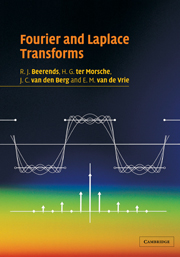Book contents
- Frontmatter
- Contents
- Preface
- Introduction
- Part 1 Applications and foundations
- Part 2 Fourier series
- Part 3 Fourier integrals and distributions
- Part 4 Laplace transforms
- 11 Complex functions
- 12 The Laplace transform: definition and properties
- 13 Further properties, distributions, and the fundamental theorem
- 14 Applications of the Laplace transform
- Part 5 Discrete transforms
- Literature
- Tables of transforms and properties
- Index
11 - Complex functions
Published online by Cambridge University Press: 05 June 2012
- Frontmatter
- Contents
- Preface
- Introduction
- Part 1 Applications and foundations
- Part 2 Fourier series
- Part 3 Fourier integrals and distributions
- Part 4 Laplace transforms
- 11 Complex functions
- 12 The Laplace transform: definition and properties
- 13 Further properties, distributions, and the fundamental theorem
- 14 Applications of the Laplace transform
- Part 5 Discrete transforms
- Literature
- Tables of transforms and properties
- Index
Summary
INTRODUCTION
In this chapter we give a brief introduction to the theory of complex functions. In section 11.1 some well-known examples of complex functions are treated, in particular functions that play a role in the Laplace transform. In sections 11.2 and 11.3 continuity and differentiability of complex functions are examined. It will turn out that both the definition and the rules for continuity and differentiability are almost exactly the same as for real functions. Still, complex differentiability is surprisingly different from real differentiability. In the final section we will briefly go into this matter and treat the so-called Cauchy–Riemann equations. The more profound properties of complex functions cannot be treated in the context of this book.
LEARNING OBJECTIVES
After studying this chapter it is expected that you
- know the definition of a complex function and know the standard functions zn, ez, sin z and cos z
- can split complex functions into a real and an imaginary part
- know the concepts of continuity and differentiability for complex functions
- know the concept of analytic function
- can determine the derivative of a complex function.
Definition and examples
The previous parts of this book dealt almost exclusively with functions that were defined on ℝ and could have values in ℂ. In this part we will be considering functions that are defined on ℂ (and can have values in ℂ).
- Type
- Chapter
- Information
- Fourier and Laplace Transforms , pp. 253 - 266Publisher: Cambridge University PressPrint publication year: 2003

